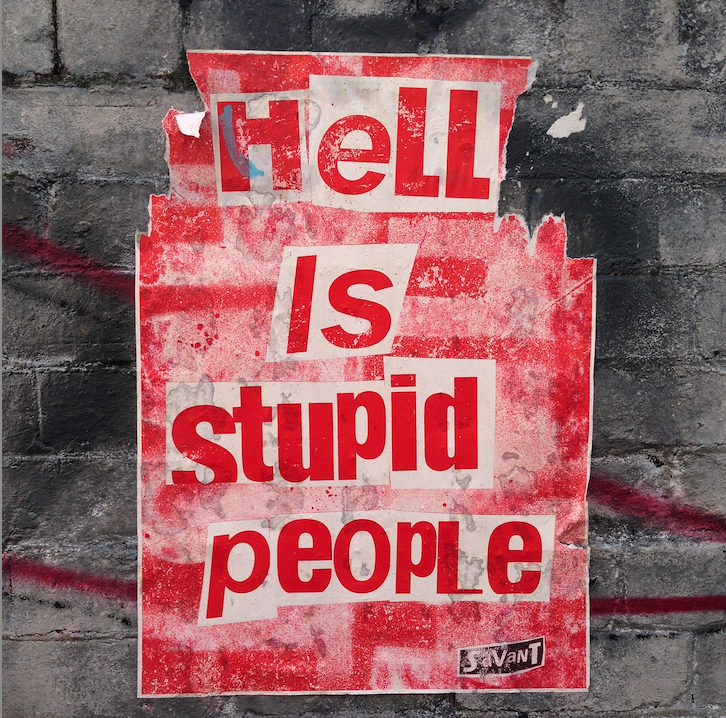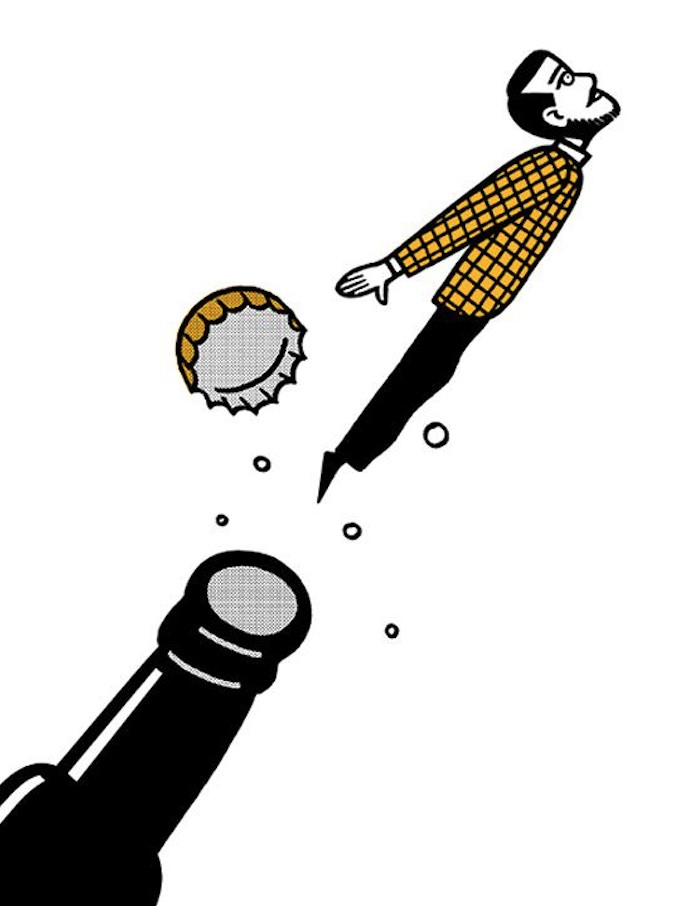If You Have To Lie, Don't Advertise
“What the large print giveth, the small print taketh away.” Tom Waits

Tom Waits hates liars and I do, too. He sued Frito-Lay for using a voice in a commercial that sounded an awful lot like him, not to mention a song that sounded a lot like his (because it was). He was awarded 2.3 million dollars, and Frito-Lay was told to lay off using his songs.
That had to hurt, since the 2.3 million was probably earmarked for the fall advertising budget, and now it was going to a guy they could’ve hired in the first place ( a friend of mine did, and said Waits was a very cooperative guy, who once said,”I’m just trying to make a buck like everybody else”).
I tried suing a company over what I felt was misleading advertising. Their headline said: “Free music downloads,” but the fine print claimed it only applied to the first month. From then on, you paid $12.99 per month.
The company claimed the disclaimer was in clear sight at the bottom of the ad. I argued they wouldn’t need a disclaimer if they weren’t all lying scumbags. I was thrown out of court for being vulgar. Waits is obviously a lot better at this than I am. He can be a real gentleman where lawsuits are concerned, especially when he’s getting 2.3 million.
He still hates liars as much as I do, and we both wish we sounded like Skip James, but we followed different roads to truth, and ended up wondering if Disneyland was simply priming kids for Las Vegas.
I spent forty years in advertising, most of which I worshipped at the feet of Bill Bernbach (Doyle, Dane, Bernbach). Bill was a little before my time, but I knew he was someone who believed in truth and integrity.
“All of us who professionally use the mass media are the shapers of society,” he once said. “We can vulgarize society. We can brutalize it. Or we can help lift it onto a higher level.”
If Bernbach were alive now, would he still see us shaping society? Or would he tell us we’ve vulgarized it?
“We have the power and skill to trick people. Or so we think. But we’re wrong. We can’t fool any of the people any of the time.”
One of Bernbach’s associates, the brilliant copywriter Bob Levenson, thought vulgarization was already happening back in 1960. He even submitted an ad to a contest organized by TIME magazine, and won.
The headline simply said “Do This Or Die.”
He went on to summarize media in general, writing: “We have the power and skill to trick people. Or so we think. But we’re wrong. We can’t fool any of the people any of the time.”
Both Bernbach and Levenson truly believed that, and it resulted in some of the most intelligent and honest advertising in history. Yet one man saw mass media at a crossroads, the other saw us playing with lies. As Levinson wrote in his famous TIME ad: “If we play tricks with the truth, we die.”
Well, we haven’t died yet. That doesn’t mean we couldn’t die. Let’s just say we’re a hair’s breadth away from stewing in our own juices. Every blog, every speech, every piece of communication shapes our society. But do we see it as a responsibility? Or do we still believe we can trick people?
Think of when Google decided to fine companies for including keywords in their SEOs that didn’t exist in the content. Then Google had to fine itself three times for doing the same thing.
In fact, we’ve been fooled by more people telling us they’re honest than people telling us they’re liars.
It’s not that we don’t believe in integrity. If we could lift society to a higher level with the truth, we’d do it. Trouble is, we’re a society used to lies and exaggerated promises. In fact, we’ve been fooled by more people telling us they’re honest than people telling us they’re liars.
In an article called Is Advertising an Art of Lying? it describes how we’re exposed to 3000 brands a day, and that’s a problem.
If there were only two or three competing, they wouldn’t have to exaggerate or lie. The market could be divided comfortably between them.
Unfortunately, monopolies are tough to maintain in an open market system. Inevitably, four or five new entries come along, and suddenly it’s a war with all kinds of casualties and brutal examples of mass backstabbings.
Not that companies go out of their way to lie. They go out of their way to protect market share. If that means dialling back the truth, then it’s acceptable—if not laudable. Lying is, afterall, the flipside of truth.
When car companies talk about reaching “a new level of automotive excellence,” we still go out and shop around. It’s not that we don’t believe them. We just figure all cars have a new level of automotive excellence. Who launches a new car without it?
Maybe we should call it “acceptable fuckery,” meaning we’re not fooled, but we need a car just the same. So we accept vulgarization, but we don’t feel “brutalized” by it. If anything, we feel mildly amused.
On the subway the other day, I heard a group of school kids talking about carrier plans. “Yeah, like we’re getting unlimited long distance for free,” one of them laughed. “As long as we call after three in the morning.”
It soon turned into a discussion about who got taken less.
That might be the greatest vulgarization of all. When lies become a hoot, where do we go next? And are we separating truth from lies, or lies from lies?
“There is not one of you who would dare to write his honest opinion,” he said to his colleagues at his retirement party.
Levenson also said: “No donkey chases the carrot forever.” He believed we’d grow weary of empty promises. Perhaps he underestimated how willing we are to accept mass media the way it is.
One of the most telling comments came from John Swainton, Chief of Staff of the New York Times. “There is not one of you who would dare to write his honest opinion,” he said to his colleagues at his retirement party.
“The business of a journalist now is to destroy the truth, to lie outright, to pervert, to vilify, fall at the feet of Mammon and sell himself for his daily bread. We are tools, vessels of rich men behind the scenes, we are jumping jacks. They pull the strings; we dance. Our talents, our possibilities and our lives are the properties of these men. We are intellectual prostitutes.”
Now there’s a man who doesn’t see lies being a hoot. Whether his colleagues felt any remorse about the state of journalism is a different story.
As I said earlier, we haven’t died. That’s not to say we couldn’t.
If journalists are destroying truth and marketers are exaggerating it, maybe we’re not so much dying as becoming what Pink Floyd described as “Comfortably Numb.”
As I said earlier, we haven’t died. That’s not to say we couldn’t. So much depends on where we go next. If we’re still separating lies from lies, then as Tom Waits once said, “We’re throwing peanuts at a gorilla.”
It’s really up to us, and we shouldn’t expect too much. Integrity’s fine if you can manage it, but it needs a lot of group participation.
Otherwise, we go back to everyone being out for themselves. Or as Tom Waits also said, “Hit your baseball into my yard, and you’ll never see it again.”
Robert Cormack is a satirist, novelist, and former advertising copywriter. His first novel “You Can Lead a Horse to Water (But You Can’t Make It Scuba Dive)” is available online and at most major bookstores. For more articles by Robert Cormack, go to robertcormack.net
Articles from Robert Cormack
View blog
“Sayin' ball of confusion, that's what the world is today, hey, hey.” Norman Whitfield and Barrett S ...

All I did was write the first Canadian rock jingle. · I still remember how we wore our jeans with le ...

In honour of Women's Day, let's see which is more offensive. · “Life is tough, darling, and we’d bet ...
Related professionals
You may be interested in these jobs
-
Cake Decorator
Found in: Talent CA C2 - 2 weeks ago
Sobeys White Rock, CanadaRequisition ID: 181801 · Career Group: Store Careers · Job Category: Retail - Bakery · Travel Requirements: 0 - 10% · Job Type: Part-Time · Country: Canada (CA) · Province: British Columbia · City: White Rock · Location: 9484 Miramar Village Thrifty Foods · Postal Code: V4B ...
-
food counter attendant
Found in: Talent CA 2 C2 - 1 day ago
FUSION BOX Calgary, CanadaEducation: No degree, certificate or diploma · Experience: Experience an asset · Tasks · Bring clean dishes, flatware and other items to serving areas and set tables · Clean and sanitize items such as dishwasher mats, carts and waste disposal units · Clear and clean tables, trays ...
-
aptpuo - january 2025 - cml3374 ja
Found in: Talent CA C2 - 5 days ago
University of Ottawa Ottawa, Canada Part timeDescription · :This course will provide an opportunity for students to examine in some detail the child protection legislation and law in Ontario. The course will include theoretical and practical content. The purposes and objectives of child protection law will be examined. The ...




Comments
Robert Cormack
2 years ago #4
Looks like I'll have to publish the two follow-up novels to “Horse” myself, Ken. Searching for a cover designer as we speak. Don Kerr has made a few suggestions. As far as ducks go, Ken, they seem to be natural scuba divers, and find the snorkel quite handy (flippers are kinda overkill, don't you agree). Turns out, I didn't have to make Wendy scuba dive. She's already done it (and she can't even swim). Lots to learn in this life, Ken (as I'm sure you know.
Ken Boddie
2 years ago #3
I keep forgetting to ask, Rob, if you’ve got another book planned, assuming that the publisher’s editing process isn’t too overwhelming. I thoroughly enjoyed “You Can Take a Horse …”
BTW I’m guessing you can’t make a duck scuba dive either.
Robert Cormack
2 years ago #2
I'll accept that it's a duck, Ken.
Ken Boddie
2 years ago #1
I accept, Rob, that advertising means bending the truth but, as long as it’s entertaining, then who cares? Furthermore, at least half the memorable ads I see on the TV fail to make me remember the product they’re pushing. As for journos telling wobblies, I believe many look like saints compared to politicians and lawyers. What amazes me, however, is that the spin merchants in the upper echelons of our society, who try to sell us incredible promises too good to be true, appear to think that we believe their bullshit.
If it walks like a duck and talks like a duck, then it stands to reason there’s a wealthy ventriloquist puppeteer pulling the strings somewhere.
Furthermore, you can’t pluck the feathers off a rubber ducky. 🤔